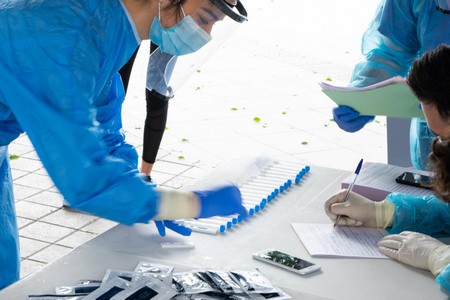It is only a matter of time before the SARS-CoV-2 virus weakens despite new mutations, argues virologist and government advisor Dr Petros Karayiannis.
Karayiannis, a Health Ministry’s Scientific Advisory Committee member, said he is cautious but not particularly worried regarding the three new COVID-19 subvariants BQ.1, BQ1.1 and XBB.
He said that re-infections would be detected in Cyprus, and their occurrence would be because these strains can partially escape immunity, but they do not appear more virulent.
But he believes a new coronavirus wave will not be as bad as the previous ones.
He explained that BQ.1 and BQ1.1 are offshoots of Omicron 5, which is currently dominant on the island.
Dr Karayiannis said many Cypriots were infected with Omicron 4 and 5 during last summer’s wave, so there is some immunity.
In addition, he notes that the updated vaccines offer protection against Omicron 4 and 5 and, therefore, could induce immunity.
Concerning subvariants BQ.1 and BQ1.1, he said that they are trying to dominate Omicron 5, and they have some advantages right now due to partial escape.
Regarding the XBB subvariants, Dr Karayiannis said this is a branch of Omicron 2 that was first detected in Singapore and is now in 17 other countries in Europe and Asia.
He said that this substrain is highly transmissible.
Asked about the vaccine’s 4th and 5th booster shots, he said that studies have shown that they stimulate immunity and cause a 60% increase in neutralising antibodies against Omicron 4 and 5.
Scientists hope that this increase in antibodies will also suppress the new strains to a large extent.
Unlike past progressions of variant competition and dominance, there isn’t one single variant supplanting BA.5 but multiple independent strains in the Omicron lineage with similar mutations rising simultaneously in different places.
Most COVID experts agree that one or a combination of these variants will inevitably trigger another wave, or multiple waves though how big remains difficult to predict.
New variants are not the only factor that drives up new cases.
The abandonment of public and personal precautions, waning immunity, and seasonal patterns, like people spending more time indoors when it’s cold, play a role as well.
There are also concerns that some of the monoclonal antibody treatments currently used against COVID will be less effective or fully ineffective against some new strains.
Cyprus fatalities have reached 1,191 since the pandemic started in March 2020 and 596,297 COVID infections.










